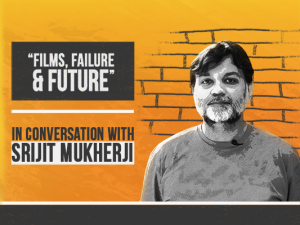Soukarya Ghosal directorial Rainbow Jelly is a first in the food fantasy genre and exhibits the tale of a unique autistic orphan child who has the power to control a person's mind. The film's cast includes Mahabrata Basu, Sreelekha Mitra, Kaushik Sen, Shantilal Mukherjee in pivotal roles.
Soukarya who started his career as a staff cartoonist and an illustrator in a Bengali daily, realised his true potential lies in cinema where he can make the best use of the audio-visual medium to tell stories. His latest movie Rainbow Jelly decides to bring some new flavours to the Bengali language film repertoire.
Q. About Soukarya Ghosal.
I was a staff cartoonist and illustrator in a Bengali daily. I used to do comics, but I felt that there was a lack of sound since we use words for sounds in comics. But while doing short frames for comics, I realized that my frames require sound. The need for sound pulled me into this industry.
Q. Rainbow Jelly's concept
The film is about a child who dreams of something. That dream results in a keyword which becomes the reason for his success in life. It is a story about a special child who dreams of becoming a little prince. He's an orphan but writes a letter to his mother every birthday, and ties the letter to a bunch of gas balloons and lets it free. He believes that the letter will find his mother. One night he dreams something which helps him crack the code for being a little prince.
We call this film a food fantasy film. It deals with seven tastes of food: sweet, salty, sour, astringent, pungent, spicy, and bitter. The boy is able to change people's minds by the taste of his food. When he cooks something sweet, the villain turns something different than when he cooks spicy. That is how he changes the villain. He defends the villain not by blocking him, not by turning him down, but by changing him into a good human being. The title signifies the final dish. It has all the seven tastes and colours, having which one would change into a new human being.
Q. The unusual topic.
I have always believed that film is an audio-visual medium, where both eyes and ears are engaged. Taste is something for which one of our sense organs is absolutely dedicated. We have seen films dealing with food, such as 'Lunchbox', or 'Charlie and the Chocolate Factory', but I haven't seen films dealing with taste. It is outside the faculty of audio-visual medium. This is what I wanted to bring into the audio-visual medium.
Q. The Cast
Sreelekha Mitra, is a very well-known actress in Bengali cinema. She acts as the fairy godmother who gives the secret recipe to the child for the rainbow jelly. The villain is Kaushik Sen, a famous actor. The protagonist is Mahabrata Basu, who acted as Ghoton. Both the character and the actor are actually special children. He is the key of the film, and he pulls this show away.
Q. Working with children.
I've always made films with children. Both 'Pendulum' and 'Load Shedding' had children as the main character. I always try to see the world through their perspective. That is how you address innocence, and through innocence, you can address the universality of a film. For me, the success of a film goes with the shelf life, which is through universality.
Q. Balancing the act.
We had three months of workshops. Mahabrata used to come after school and leave before his coaching started. When he came onto the floor, he was ready. We shot the entire film in only 16 days. That is how our education system is. You practice daily, and you go for the exam on the final day.
Q. Filmmaking style of Soukarya.
Each film is different. My first film 'Pendulum' was surrealistic. The painter would take the audience into the painting. The film was dark and had noir elements. The second film is a teenage love story. The third film is a food fantasy. They are different, but my camera and narrative always see the world from a child's perspective. I believe that each of us have a child inside us, and a lot of problems can be solved if we use that perspective.
Q. 'OTT' film viewing experience.
They're changing the entire landscape of film-making. They're also changing the budgeting process. If you can capture an AV experience into a mobile phone, it would be captivating and allow us to make more stories. But this platform is not antagonistic to the cinema and should be used coherently. This platform helps us to experiment with storytelling, which is what everything boils down to. The successful experiments would go to the big screen. They should go hand in hand.
Q. The tangent of Bengali films.
We have a hangover of the celebration of going abroad. This is evident from Satyajit Ray to Mrinal Sen to Ritwik Ghatak, this celebration is evident. Even though it helped us grow, this philosophy also slowed us down. We could not create our own philosophy since we followed the old ways. Instead of taking the good things and using them to create something new, we copied them too much. By that time, other regional industries grew. But Bengali films will find their prime focus again. However, we should not make things strictly for a regional market. It should cater to other languages and other markets as well. When I see films like 'Tithi', I don't see it as a movie of a different language. I hope this comes soon to the Bengali market.
Q. The icing on language films.
Regional films are local. At the very basic point of view, something which is universal should also be basic. But this local view should not confine the story to the region itself. Cinema should go beyond the language of verbal communication.
Also READ/WATCH other INTERVIEWS:






